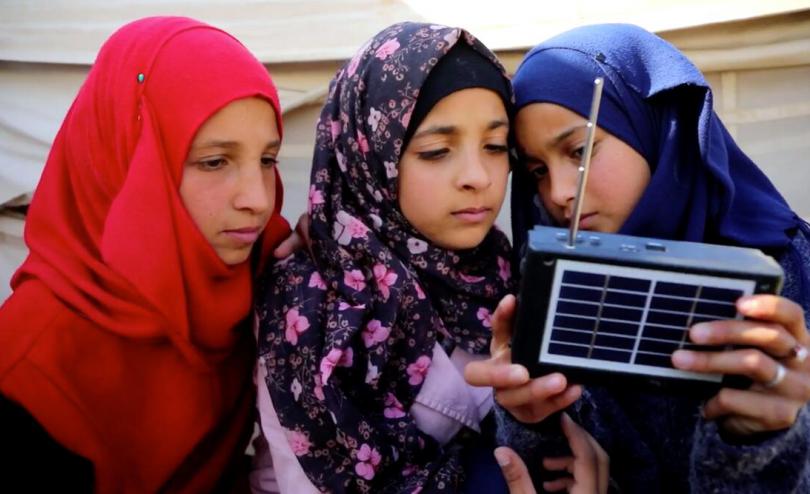‘Anywhere but Syria’: After ten years of war, the vast majority of children can’t imagine a future in the country

After ten years of war, the vast majority of Syria’s children cannot imagine a future in their country, according to a new report by Save the Children. On average, 86% of Syrian refugee children surveyed in Jordan, Lebanon, Turkey and the Netherlands said they would not want to return to their country of origin[i].
Of children displaced inside Syria, one in three would rather be living in another country.
Children who fled their homes are struggling to feel safe where they are now, as around two in five children of those surveyed by Save the Children said they face discrimination and a lack of education. Many feel they have no say over their future.
Next week marks ten years since nationwide protests descended into a deadly conflict that has killed hundreds of thousands, displaced millions of children and their families, and decimated Syria’s economy and infrastructure.
Every aspect of children’s lives has been torn apart, leaving them uprooted and without a real sense of home, according to a Save the Children report that was published today.
For the report 'Anywhere but Syria’ – the largest piece of research of its kind by Save the Children – the organisation interviewed over 1,900 displaced children and their caregivers inside and outside Syria. The report finds that, of those interviewed:
- Only 3% of the children surveyed in Turkey, 9% in Jordan and the Netherlands, and 29% in Lebanon want to return to Syria;
- For children across all countries, an end to violence in Syria (26%) was most frequently mentioned when asked about their biggest wish for the future, followed by education (18%);
- 44% of all children in the study had experienced discrimination in their neighbourhood or in school. Inside Syria, 58% reported being discriminated against;
- Within the same sample, 42% of respondents were not attending school, with only 31% having access to learning in Lebanon, and less than half (49%) in Jordan.
Lara*, 7, was forced to flee her hometown in Maarat al-Numan in Idlib three years ago. Having been displaced several times, her family now live in a camp in Idlib.
Lara said: “After ten years, our future became all about war. Our life in Syria is difficult, our house was destroyed in our village and now we live in a tent.
“I wish to live in any country other than Syria, where it’s safe and there are schools and toys. It’s not safe here, the sound of dogs scares me and the tent is not safe."
Of all children who participated in the research, those displaced inside Syria felt the least connected to their communities. They were significantly more likely to report having experienced discrimination than their peers in Jordan or Lebanon, despite being in their country of origin.
Even before the harsh economic impact of the COVID-19 crisis, 80% of people in Syria had been living below the international poverty line[ii]. Recent figures have shown that 6.2 million of the country’s children are going without food.
The hardship of Syrian children and their families has not stopped at the country’s border, Save the Children said. In Lebanon —gripped by an economic crisis, political instability, COVID-19 outbreaks, and the impact of last year’s explosion in Beirut — nine out of ten Syrian refugee families are living in extreme poverty, according to the UN[iii].
Nada*, 17, was born in Syria with a disability that affected her nervous system. She currently lives in Akkar, North Lebanon.
She said: “My dream is to become a doctor. But I don’t have an education. There’s no safety, I can’t even go to school. My dream is to go to school and be just like my siblings.
“I don’t want to go back there. I don’t want to go back and live in Syria again. I don’t want to stay in Lebanon either. No matter where I go. If we go to school, they bully us and tell us they don’t want us.
In the survey, children also highlighted the importance of accessing a good education, and the deep impact on their wellbeing of this being out of reach.
By contrast, in the Netherlands, 70% of Syrian children saw a positive future, and all children surveyed received an education. Those who wanted to stay in the Netherlands – more than eight in ten – mentioned language, education, economic opportunity and ‘freedom’ as reasons.
Save the Children’s Regional Director for the Middle East and Eastern Europe Jeremy Stoner said: “Whether inside or outside Syria, children affected by this conflict are still struggling to feel at home where they are. This ten-year war has cost Syria’s young people their childhoods, but the world should not allow it to rob them of their future. Protracted conflict has led to fear and pessimism about children’s ability to build their lives in a country scarred by war. Children need to feel safe; they need to feel that they belong and are connected to the communities they live in.
Save the Children’s Syria Response Director Sonia Khush said: “Globally, in the midst of a pandemic, we have been reminded of the importance of compassion, humanity and shared responsibility across borders. If action is not taken now, there is a risk this milestone will become a grim marker of a second generation of Syrian children losing their opportunities for a decent childhood and a future.”
Save the Children is calling on all stakeholders to protect Syria’s children from the physical and psychological violence that has been plaguing their lives for the last 10 years. Syrian children have a right to grow up in an environment where they are free from constant fear for their safety, are not forced to live in displacement and fear of further uprooting, and are no longer discriminated against simply because of where they come from.
Notes to editors:
- Save the Children interviewed 1,900 Syrian children aged 13-17 in Syria, Jordan, Lebanon, Turkey and the Netherlands. Short surveys were conducted with parents and caregivers.
- The news comes just months after the inauguration of the new US President Joe Biden, who has already reversed a ban on people entering the US from countries including Syria – as well as signing an executive order re-starting the country’s refugee resettlement programme. The programme will see the annual cap on refugee admissions increase from 15,000 to 125,000. UNHCR said this would ‘save lives.’
- Save the Children is providing a range of services for children displaced inside Syria. Directly or through partners, the organisation runs education spaces, vaccination centres, and provides emergency relief for displaced populations.
[i] The average percentage of children who don't wish to return to Syria is calculated by aggregating the answers to this question from children in Turkey, the Netherlands, Lebanon and Jordan and dividing the total percentage by four
[ii] $1.90 per day
For any enquiries, please contact:
Emily Wight, Emily.wight@savethechildren.org
Ahmed Bayram, ahmed.bayram@savethechildren.org
Out-of-hours (GMT) and weekend: Media@savethechildren.org.uk / +44 7831 650 409




